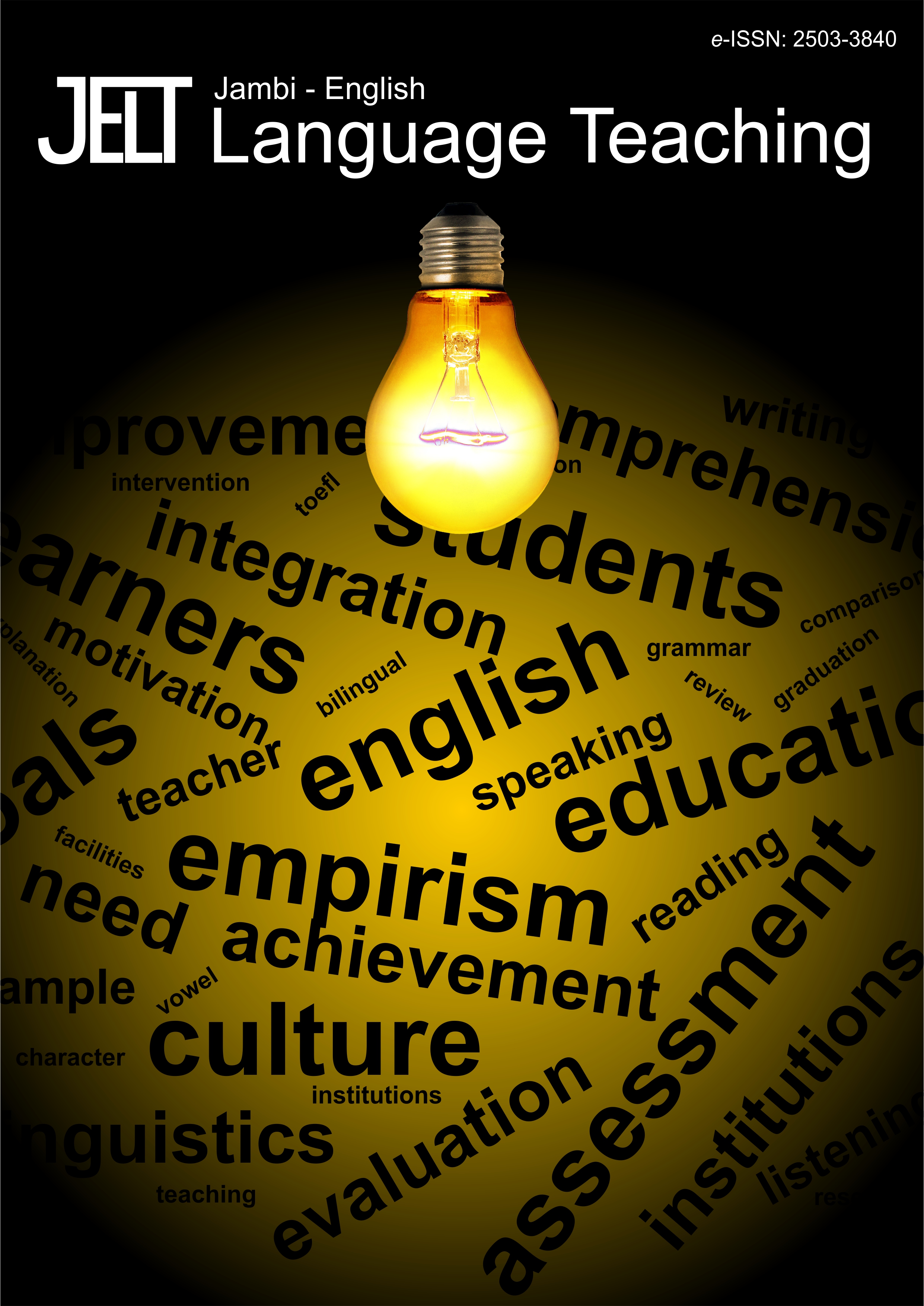STUDENTS' PERCEPTION ON THE USE OF WHATSAPP APPLICATION FOR ONLINE LEARNING DURING THE COVID-19 PANDEMIC
Main Article Content
Abstract
The impact of the spread of the covid-19 virus on the world of education requires educators and students to be adapted quickly to existing changes. Before the pandemic, the learning activity was original to be held face-to-face directly in the classroom, however, an integrated learning system through the virtual internet network (online learning) must be implemented during the pandemic. The implementation of English learning for students was still done online using WhatsApp. Based on this, the purpose of this study was to investigate students’ perceptions on the use of the WhatsApp application for online learning during the covid-19 pandemic.
This study employed quantitative research with a survey method. This study used questionnaire data to collect the data. The results of questionnaire data analysis indicated that 122 of 168 respondents gave a good perception of the use of the WhatsApp application. In addition, the teacher used the features provided in the WhatsApp application, such as messages, voice messages, documents, videos, and images to improve students’ ability and evaluate the extent of students’ ability with the material that had been studied.
The conclusion of the study is the existence of the benefits of WhatsApp media that teachers can use for learning English. Because WhatsApp has many advantages that support learning, this application can be used to send text messages, download and upload images, documents, or videos, and send voice messages.
Downloads
Article Details

This work is licensed under a Creative Commons Attribution-ShareAlike 4.0 International License.
References
Abidin, Z., Rumansyah, Arizona, K. (2020). Pembelajaran online berbasisproyeksalahsatusolusikegiatanbelajarmengajar di tengahpandemi covid-19.JurnalIlmiahProfesiPendidikan, 5(1), 2620-8326. https://doi.org/10.29303/ jipp.v5i1.111. (retrieved on 27 september 2021).
Ainun, N. H., Nurweni, A., &Sholihah, L. (2020). The students’ perception of voice chatting through WhatsApp in speaking class.In International Conference on Progressive Education (ICOPE).
Afsyah, S. (2019).WhatsApp application in English language teaching (ELT) context: Media to describe people. Utamax: Journal of Ultimate Research and Trends in Education, 1(1), 23-28.
Aliaga, M. & Gunderson, B. (2002).Interactive statistics. [Thousand Oaks]: Sage Publications
Arifin, Z. (2012). Penenlitianpendidikanmetodedanparadigmabaru. Bandung: RemajaRosdaKarya.
Arikunto, S. (2006).Metodepenelitiankualitatif. Jakarta: BumiAksara.
Cutland CL, Lackritz EM, Mallett-Moore T, Bardajà A, Chandrasekaran R, Lahariya C, et al. Low birth weight: Case definition & guidelines for data collection, analysis, and presentation of maternal immunization safety data. Vaccine. 2017;35(48):6492–500.
Creswell, J. W. (2010). Research design: Pendekatankualitatif, kuantitatif, dan mixed. Yogjakarta: PT PustakaPelajar
Creswell, J. W. (2012). Educational research: Planning, conducting, and evaluating quantitative and qualitative research (4th ed.).
Creswell, J. W. (2013). Research design pendekatankualitatif, kuantitatif, dan mixed. edisiketiga. Yogyakarta: PustakaPelajar.
Dweikat, K. A. J. (2019). EflStudents’perceptions of Whatsapp and its Potential Benefits InElt Practicum. Palestinian Journal of Technology and Applied Sciences (PJTAS), (2).
He, W., Xu, G., &Kruck, S. (2014). Online IS education for the 21st Century .Journal of Information Systems Education.
Khan, R. M. I., Radzuan, N. R. M., Farooqi, S. U. H., Shahbaz, M., & Khan, M. S. (2021). Learners' Perceptions on WhatsApp integration as a learning tool to develop EFL vocabulary for speaking skill. International Journal of Language Education, 5(2), 1-14.
Kheryadi. (2017). „Improving students’ writing narrative through writing games for acceleration class‟, EduLite: Journal of English Education, Literature and Culture, 2(2), 377–388.
Kinsky, E. S., Freberg, K., Kim, C., Kushin, M., & Ward, W. (2016).Hootsuiteuniversity: Equipping academics and future pr professionals for social media success. Journal of Public Relations Education, 2(1), 1-18.
Mbukusa, N. R. (2018). Perceptions of students' on the use of whatsapp in teaching methods of english as second language at the university of namibia. Journal of Curriculum and Teaching, 7(2), 112-119.
Mistar, I., &Embi, M. A. (2016).Students ‘perception on the use of WhatsApp as a learning tool in ESL classroom. Journal of Education and Social Sciences, 4(6), 96-104.
Molinda, M. (2005).Technology and media for learning.
Nasution.Berbagaipendekatandalam proses belajarmengajar (Jakarta: PT. BumiAksara, 2013).
Nuraeni, C., &Nurmalia, L. (2020).Utilizing WhatsApp application in English language learning classroom. Metathesis: Journal of English Language, Literature, and Teaching, 4(1), 89-94.

